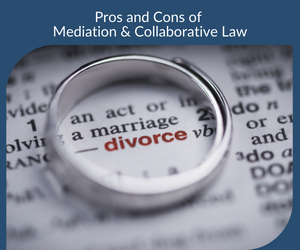
Not every divorce is the same, and not every divorce fits into the same pattern or process. Because of this, there are options when it comes to the divorce process, and someone approaching this situation should carefully and thoroughly consider their options before taking the next step.
There is the traditional divorce process, which involves relying on the court to make the final decisions, and there are non-traditional processes such as mediation and collaborative law where those getting a divorce have more control. As mentioned above, each divorce is different and because of this, some divorces might benefit from the traditional process while others might benefit from the non-traditional processes. In this article, let’s take a closer look at the non-traditional options.
Mediation allows a couple to work together on a solution to divorce via a neutral third party, and collaborative law allows a couple to work together on a solution to divorce while each party is represented by their own collaborative attorney. If someone is interested in these non-traditional options, below are some pros and cons of each to help them decide what is best for their situation:
Mediation
- Pros: The process is flexible and informal, a neutral party is involved to help with negotiating, a mediator does not make the final decision for one’s case, and it is typically less expensive when compared to litigation.
- Cons: If a couple cannot come to an agreement via mediation, they may need to start the process anew, likely in the court. Please note that this does not mean all-out litigation, but it could mean considering different options such as collaborative law.
- Conclusion: If someone who is entering a divorce feels they can work with their spouse to come to an agreement that is reasonable and acceptable to both sides without litigation, and is looking for one of the more flexible routes, mediation could be the option for them.
RELATED: Read these top Q&As about mediation.
Collaborative Law
- Pros: The process provides some flexibility while having each spouse represented by a collaborative attorney. The spouses and their collaborative attorneys negotiate in four-way meetings, and it is typically less expensive when compared to litigation. Other collaborative experts can also assist the parties and attorneys in the collaborative process.
- Cons: If a couple cannot come to an agreement via collaboration, their collaborative attorneys are required to withdraw from their case, and the couple seeking a divorce would have to start over with finding other divorce attorneys and/or finding another divorce process.
- Conclusion: If the parties can work together through the collaborative process while receiving the assistance of counsel, this option might be for them.
RELATED: Read these top Q&As about a collaborative divorce.
Regardless of which option one chooses, we highly recommend that they consult with an experienced divorce attorney who can provide a knowledgeable recommendation and ensure that all options are being considered.
If you have questions about this information, or if you would like information about what our experienced attorneys at Wilder Mahood McKinley & Oglesby can do to help you in your divorce, contact us online or call our office in Pittsburgh, Pennsylvania, at 412-261-4040.
FAMILY LAW SERVICES
Divorce
Legal Separation
Prenuptial & Postnuptial Agreements
Tax Issues
Fees
Adoption
Same-Gender Marriage
Domestic Partnerships
Child Custody
Family Support
Mediation in Divorce Matters
Collaborative Law Services










